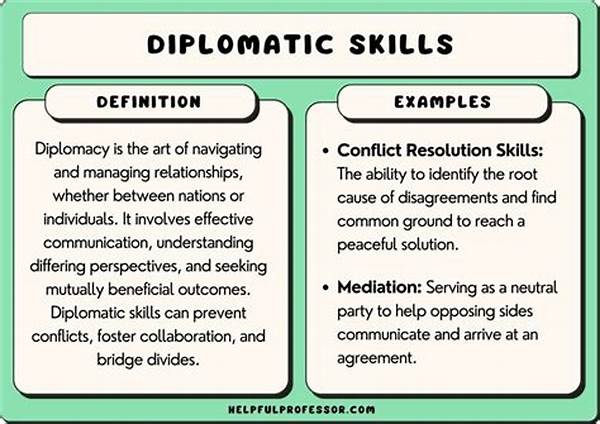In the realm of international relations, diplomacy serves as the cornerstone of peaceful and constructive interactions between nations. Language, as a critical tool of diplomacy, plays a pivotal role in fostering mutual understanding and collaboration. Effective diplomacy through language is not merely about the words spoken; it encompasses the ability to communicate intentions, negotiate differences, and cultivate lasting relationships. The nuances of language can either bridge divides or exacerbate tensions, making it imperative for diplomats to harness language effectively to achieve diplomatic objectives.
The Role of Language in Diplomacy
Language in diplomacy extends beyond mere conversations and negotiations. It embodies the cultural ethos and historical context of the represented nations. Effective diplomacy through language requires a profound comprehension of these linguistic subtleties. By mastering the art of eloquent discourse, diplomats can foster a sense of trust and respect, crucial for successful engagements. Understanding the cultural and contextual nuances enables diplomats to anticipate reactions, mitigate potential conflicts, and promote collaborative efforts. Additionally, effective language use in formal documents, treaties, and agreements helps prevent ambiguities and misinterpretations, ensuring that all parties involved share a common understanding.
Furthermore, effective diplomacy through language is instrumental in public diplomacy, where nations communicate directly with foreign publics to build favorable perceptions. Skilled language use can successfully convey national values and policies, influence public opinion, and create an environment conducive to international cooperation. Failure to employ language adeptly, on the other hand, may lead to misunderstandings or mistrust, undermining diplomatic efforts. Thus, language is a powerful vehicle for diplomacy, enabling the navigation of complex international terrains and facilitating peaceful coexistence.
Key Elements of Linguistic Diplomacy
1. Cultural Sensitivity: Effective diplomacy through language requires understanding and respecting the cultural contexts of the participating entities.
2. Clarity and Precision: Ambiguities must be minimized to ensure the clear conveyance of intentions and terms.
3. Active Listening: Comprehending not only what is said but also what is meant is crucial for successful diplomacy.
4. Non-Verbal Communication: Effective diplomacy through language includes understanding body language and non-verbal cues.
5. Adaptability: Diplomats must be adept at adjusting their language and tone according to the situation and audience.
Challenges in Diplomatic Communication
Despite the profound importance of language in diplomacy, several challenges persist in its effective use. Miscommunication due to language barriers or cultural misunderstandings can compromise diplomatic efforts, resulting in unintended consequences. Effective diplomacy through language requires careful selection of words and phrases that convey the intended message without eliciting offense, even in the face of complex political situations. Diplomats must continuously update their linguistic proficiency and cultural understanding to remain relevant and effective amidst dynamic global changes.
Moreover, political rhetoric and media portrayals can sometimes distort diplomatic narratives, further complicating diplomatic communication. Both official and unofficial channels must be managed meticulously to ensure consistent messaging. Additionally, the rise of digital communication poses both opportunities and challenges for diplomacy, necessitating adeptness in articulating positions in a medium that lacks the nuance of face-to-face interaction. Effective diplomacy through language in this modern context is dependent on the careful balance of traditional skills and new-age digital proficiency.
Strategies for Diplomatic Language Mastery
1. Continuous Learning: Diplomats must immerse in language studies and cultural contexts to enhance their effectiveness.
2. Engagement in Dialogue: Regular participation in discussions with varied linguistic groups ensures deeper understanding.
3. Analytical Skills: Assess situations critically to choose appropriate language for diplomatic interactions.
4. Translation Accuracy: Effective diplomacy through language requires correct translations that maintain the intended meaning.
5. Mediator Role: Languages play a key role in soothing tensions and brokering peace during conflicts.
6. Policy Shaping: Language influences policy formulation and international consensus-building.
7. Perception Management: Language is crucial in shaping and maintaining a positive perception on the global stage.
8. Crisis Communication: Effective diplomacy through language aids in managing and communicating during crises.
9. Language Functions: Utilize language functions such as persuasion, negotiation, and mediation adeptly.
10. Public Diplomacy: Languages facilitate direct engagement with foreign publics to convey messages effectively.
Language as a Diplomatic Tool
In an age where global interaction is inevitable, language remains an indispensable tool for diplomacy. Its proper use fosters understanding, mitigates conflicts, and enhances collaboration among nations. Effective diplomacy through language not only facilitates negotiation but also acts as a cultural bridge, promoting mutual respect and cooperation. Diplomatic language encourages open dialogue and the exchange of ideas, ultimately contributing to global peace and stability.
Understanding the power of effective diplomacy through language is crucial for diplomats aiming to secure international agreements and foster long-lasting partnerships. Mastery over linguistic intricacies ensures that dialogue is productive, fostering collaboration and understanding among countries. Consequently, prioritizing language studies and cultural immersion are paramount for those engaged in the diplomatic arena. By doing so, diplomats are better equipped to translate words into actions, creating a harmonious and stable international environment.
Conclusion
In conclusion, effective diplomacy through language is of paramount importance in the international sphere. Language serves as a bridge that connects diverse cultures and facilitates the resolution of conflicts. Mastery of linguistic nuances enhances diplomatic efforts, ensuring that communication fosters understanding and cooperation. Diplomats must continually develop their language skills and cultural knowledge to remain effective in an ever-changing global landscape. By doing so, they contribute significantly to peaceful international relations, demonstrating that language is indeed a powerful tool for effective diplomacy. In the end, effective diplomacy through language transcends mere communication; it embodies the essence of human connection and collaboration on a global scale.





